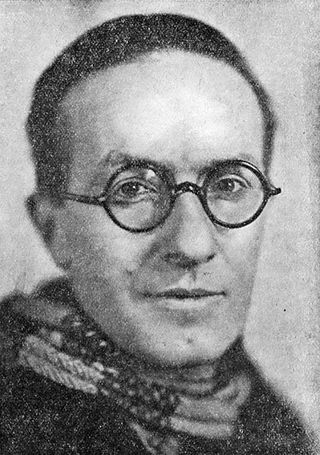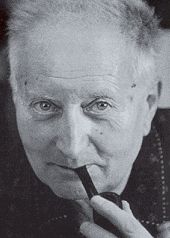Related Research Articles

The Prix Goncourt is a prize in French literature, given by the académie Goncourt to the author of "the best and most imaginative prose work of the year". The prize carries a symbolic reward of only 10 euros, but results in considerable recognition and book sales for the winning author. Four other prizes are also awarded: prix Goncourt du Premier Roman, prix Goncourt de la Nouvelle, prix Goncourt de la Poésie (poetry) and prix Goncourt de la Biographie (biography). Of the "big six" French literary awards, the Prix Goncourt is the best known and most prestigious. The other major literary prizes include the Grand Prix du roman de l'Académie française, the Prix Femina, the Prix Renaudot, the Prix Interallié and the Prix Médicis.

Hippolyte Jean Giraudoux was a French novelist, essayist, diplomat and playwright. He is considered among the most important French dramatists of the period between World War I and World War II.
This article contains information about the literary events and publications of 1983.
This article contains information about the literary events and publications of 1973.

Joseph Kessel, also known as "Jef", was a French journalist and novelist. He was a member of the Académie française and Grand Officer of the Legion of Honour.

The Prix Femina is a French literary prize created in 1904 by 22 writers for the magazine La Vie heureuse. The prize is decided each year by an exclusively female jury. They reward French-language works written in prose or verse, by both women and men. The winner is announced on the first Wednesday of November each year.

Jean Giono was a French writer who wrote works of fiction mostly set in the Provence region of France.

Emmanuel Carrère is a French author, screenwriter and film director.

Maryse Condé is a French novelist, critic, and playwright from the French Overseas department and region of Guadeloupe. Condé is best known for her novel Ségou (1984–85).

Abdourahman A. Waberi is a novelist, essayist, poet, academic and short-story writer from Djibouti.
Proletarian literature refers here to the literature created by left-wing writers mainly for the class-conscious proletariat. Though the Encyclopædia Britannica states that because it "is essentially an intended device of revolution", it is therefore often published by the Communist Party or left wing sympathizers, the proletarian novel has also been categorized without any emphasis on revolution, as a novel "about the working classes and working-class life; perhaps with the intention of making propaganda". This different emphasis may reflect a difference between Russian, American and other traditions of working-class writing, with that of Britain. The British tradition was not especially inspired by the Communist Party, but had its roots in the Chartist movement, and socialism, amongst others. Furthermore, writing about the British working-class writers, H Gustav Klaus, in The Socialist Novel: Towards the Recovery of a Tradition (1982) suggested that "the once current [term] 'proletarian' is, internationally, on the retreat, while the competing concepts of 'working-class' and 'socialist' continue to command about equal adherence".
Rieu can refer to:
Colline is a 1929 novel by the French writer Jean Giono. It has also been published as Hill of Destiny. It tells the story of a small hamlet in Provence where the superstitious residents struggle against nature, as their settlement is struck by several misfortunes. Colline was Giono's debut novel. It is the first installment in the author's Pan trilogy; it was followed by the standalone novels Lovers are Never Losers and Second Harvest.

Jeanne Galzy (1883–1977), born Louise Jeanne Baraduc, was a French novelist and biographer from Montpellier. She was a long-time member of the jury for the Prix Femina. Largely forgotten today, she was known as a regional author, but also wrote three novels early in her career that explore lesbian topics; she has been referred to as one of the "pioneers in the writing of lesbian desire and despair."
Burnt Offering is a French novel by Jeanne Galzy. Published in French in 1929, it won the 1930 Prix Brentano and was subsequently published in English, as the only one of the author's many novels.
The Grand prix Jean Giono is a French literary prize. It was established in 1990 at the initiative of Michel Albert, to honour the writer Jean Giono. Since 1992 it consists of two categories: the Jean Giono Grand Prize and the Jury Prize. The winner of the Grand prix Jean Giono receives 10,000 euros.
The prix Erckmann-Chatrian is a literary award from Lorraine, awarded every year since 1925 in memory of the literary duo Erckmann-Chatrian. It rewards a written prose work by someone form Lorraine or about Lorraine. It is often nicknamed the "Goncourt lorrain". The jury consists of literary figures of the four Lorraine departments.
Jean Giono was a French author who wrote works of fiction mostly set in Manosque in the Provence region of France.
Charif Majdalani is a French-Lebanese writer. Born in Beirut in 1960, he is a novelist and professor at Saint Joseph University, where he was head of the Department of French Literature from 1999 to 2008. A member of the editorial board of L'Orient littéraire, he is also President of the International Writers’ House in Beirut.
Major poetry related events taking place worldwide during 2021 are outlined below under different sections. This includes poetry books released during the year in different languages, major literary awards, poetry festivals and events, besides anniversaries and deaths of renowned poets etc. Nationality words link to articles with information on the nation's poetry or literature.
References
- 1 2 3 Fay, Eliot G. (1930). "Prix Brentano". The French Review . 3 (3): 169–73. JSTOR 380090.
- ↑ Miller, Henry (1969). Mémoires, Plaidoiries Et Documents. New Directions. p. 110. ISBN 9780811201087.
- ↑ "[The Prix Brentano for 1930]". The Writer . 43: 23. 1931.
- ↑ "Untitled". Books Abroad . 3 (4): 381. 1929. JSTOR 40069235.